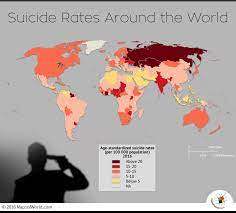From Worldometer (new COVID-19 deaths yesterday):
DAY USA WORLD Brazil India South Africa
June 9 1093 4732 1185 246 82
July 22 1205 7128 1293 1120 572
Aug 12 1504 6556 1242 835 130
Sept 9 1208 6222 1136 1168 82
Oct 21 1225 6849 571 703 85
Nov 25 2304 12025 620 518 118
Dec 30 3880 14748 1224 299 465
Jan 14 4142 15512 1151 189 712
Feb 3 4005 14265 1209 107 398
Mar 2 1989 9490 1726 110 194
April 6 906 11787 4211 631 37
May 4 853 13667 3025 3786 59
June 1 287 10637 2346 3205 95
July 7 251 8440 1595 817 411
Aug 4 656 10120 1118 532 423
Sept 1 1480 10470 703 505 235
8 1700 9836 250 339 253
14 1934 9001 709 281 300
22 2228 9326 839 279 124
29 2190 8859 643 309 108
Oct 5 1811 7495 686 285 103
6 2102 8255 543 315 59
11 1480 6784 176 229 83
12 1819 7544 201 249 37
Summary:
- Higher, but as expected, for the Worldometer Thursday numbers almost always are higher than on Wednesday.
- The USA had 99,775 new cases and #2 UK at 42,606.
- Singapore had 3190 new cases, which for them is extremely high. On a new cases/capita basis, Singapore was at 532/million. The U.S.? 332/million, or less than Singapore.
Yesterday I reported on Norway, which has a particularly stable society. Yet, every so often, someone goes berserk and kills a lot of people for reasons that befuddle local experts. Keep in mind that
Norway has about the lowest incident of homicides in the world. Japan is way down there at 0.31 per 100,000 residents, but Norway is close by with 0.52. The USA is at ten times that rate and El Salvador around 100.
A decade ago a citizen lost it, detonated a bomb in Oslo and went on to shoot a bunch of others. When the dust cleared, 77 were killed.
Then yesterday, just outside of Oslo, someone killed five in a bow and arrow attack. The only conclusion authorities have is that there are right-wing extremists in the country. Surely sounds like what might be to come in the U.S. That latest perpetrator, 37-year old
Espen Brathen, was a loner who was a Muslim convert, so you wonder if this one might have terroristic inclinations.
Incidentally, while the Japanese are not into homicides,
suicides are increasing. While their rating is not particularly high (
not close to the top ten), just last year, this pandemic induced 415 students from elementary through high schools to take their own lives. The worst suicide countries are Lesotho at 72.4/100,000, South Korea #4 at 28.6 and Russia #9 at 25.1. The lowest suicides are in the Caribbean.
A bit of good news for senior citizens. Beginning in 2022 our (
70 million of us)
Social Security payments will increase by 5.9%, the biggest boost in 40 years. In 1982 the jump was 7.4%. Mind you, don't go out and buy a car, for the adjustment will still amount to less than $100/month/individual.
One more dalliance, the Terry McAuliffe (D, left) versus Glenn Youngkin (R) Virginia governor's election which will occur on November 2. Democrats have been in power for the past 12 years, but pundits have weighed in to say that this race is now a toss-up. This is crucial, because Youngkin is a typical clone of a Trump-candidate who will run in November of 2022. If Youngkin prevails, the Congress will come under Republican control.
However, I still think that, whether it is Virginia next month or the nation in November of 2022, there will be a sufficient number of Republicans with conscience who will not vote for any Trump-supported candidate, not necessarily voting Democratic, but just not showing up at the poll. Turns out that the
betting odds show McAuliffe winning. So if this occurs, that will omen well for Democrats increasing control of both chambers, against all odds in recently previous mid-term elections.
Nature:
...reported a disturbing study of the world’s youth—a survey of 10,000 people age 16 to 25, from 10 representative countries, for their feelings about climate change.
Some 75 percent said the “future is frightening.” Fear was more common in poorer, more vulnerable countries—but according to the study, 46 percent of young Americans, and 56 percent of youth worldwide, think that “humanity is doomed.” (Pictured above, protesters during a Climate Change Awareness rally in Sydney.)
On that note, James Hanson sent me another of his weekly missives. Started with:
To quote:
The UN Conference of the Parties (COP26) for the Framework Convention on Climate Change will be in Glasgow 1-12 November. There is a chance that Boris Johnson, UK Prime Minister and meeting host, might make this COP more effective than prior COPs, as discussed below.
Prior COPs have been characterized by self-delusion so blatant that one of us (JEH) describes the backslapping congratulations at the end of the COPs as a fraud. We cannot blame it all on the political leaders, however. We scientists deserve a large part of the blame.
Further:
Young people have the most at stake with climate change. As discussed in a communication last week,[1] they provide reason for optimism. Potential leaders among young people are capable of seeing the forest for the trees and they have a desire to follow the data. Two actions are essential if we are to phase down GHG emissions rapidly. The first, as described many places, most recently at Can Young People Save Democracy and the Planet?,1 is the need for a rising carbon fee as a foundation that will make all other carbon-reduction policies work faster and more effectively. The funds (collected from fossil fuel companies) must be distributed uniformly to legal residents – otherwise the public will never allow the fee to rise to the levels needed to rapidly phase down carbon emissions.

The second essential action is whole-hearted support for development and deployment of modern nuclear power. Otherwise, gas will be the required complement to intermittent renewable energy for electricity generation. Gas implies pipelines, fracking, air and water pollution, and emission of CH4 and CO2 that would assure climate disaster. Modern nuclear power, in contrast, has the smallest environmental footprint of the potential energies because of its high energy density and the small volume of its waste, which is well-contained, unlike wastes of other energy sources.
Not sure if our youth would necessarily agree with Hanson about nuclear fission, but he uses a lot of technical graphics:
The problem with the above is that decision-makers are not particularly swayed by his arguments, which have gone on now for many decades. In a way, his argument is too scientific. Coincidentally, the Star Advertiser this morning had two op-ed contributions that presented similar point of views. They are again hammering on what they have been saying for a long time, and, while they need to continue doing so, not much will happen in Glasgow because nothing truly dangerously life-threatening has yet really occurred. The FIRE will come, but until then, more talk, more agreement and zero effective response. That's the nature of our society.

- The essence of his plea is that Biden is not doing anything about his promise, and that he is actually doing nothing about Trump's anti-environmental decision regarding the Joshua tree.
- He doesn't even mention this, but the problem is that the Senate will never pass anything that will compromise fossil fuels, one because Joe Manchin is from West Virginia, and two, because the oil/gas/coal industry will find ways to neutralize anything that compromises their profits. There will be movement if in the mid-term elections Democrats win a few more seats and the House remains Democratic. But don't hold your breath waiting for anything monumental.
- Touts Hawaii leadership in heading for 100% renewable energy to stimulate similar goals for the nation.
- First of all, they're only talking about electricity, which is a little more than a third of the energy used in the community. Nothing about air transport, etc.
- There is good reason for shifting from fossil fuels to locally produced energy as we won't need to import energy, thus retaining these funds to be multiplied in the economy. Also, it is more secure, if economically sensible.
- However, it really hurts to:
- Replace any fossil fuel if a particular renewable energy source costs a lot more or is unreliable. Winds and the sun come and go. Batteries are very expensive.
- Unilaterally move ahead on global warming measures because that will weaken the local economy to make us uncompetitive on the world market.
- The bottom line is that the decision to make sacrifices and add carbon taxes has to be done by everyone at the same time.
Thus, all three points of view by Hanson, Horning and Mikiluna are wonderful and necessary, but hardly sufficient for real action. What is the solution? The FIRE, which will come. Anything better? Sure, the world truly committing to do something about climate warming. Will this occur. I think not. So what? The FIRE, a global crisis somewhat evocative of the James Baldwin's warning. Hope I'm wrong.
-




















Comments
Post a Comment